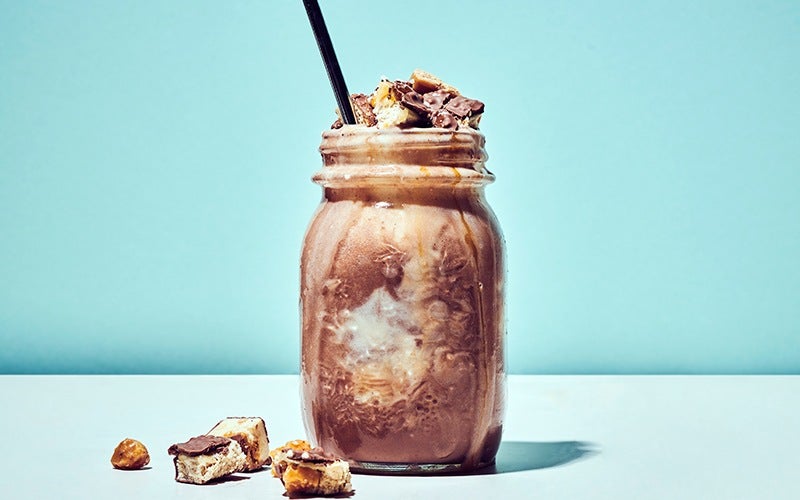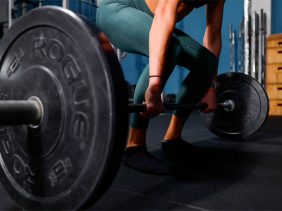Protein Shakes Compared: What really matters
 ©foodspring
©foodspring
A large number of successful athletes, actors & nutrition coaches swear by protein shakes.
We will explain the various quality markers and show you which protein shake is right for which specific objectives.
The benefits of protein shakes
Proteins are the building blocks of all life and play a particularly important role in nutrition. Regular exercise increases the need for protein to 1.8 grams per kilogram of body weight.
The increased daily protein requirement has to be covered by your diet or sports nutrition.
Protein shakes are the easiest and most convenient way of adding to your normal food to cover this daily protein requirement.
One shake a day makes an additional 20 grams of protein available to your body, which it can use for building and regeneration processes within the muscles.
- Against sudden cravings
- Fast supply of essential amino acids
- Support for muscle building
- Low-calorie snack for body sculpting
Protein shake for weight loss
The key to losing weight is a sufficient supply of protein. The fast-acting protein in a protein shake lends itself to consumption after physical exercise to supply the muscles with the necessary nutrients.
Vegan Protein – The plant-based alternative
For: Weight loss protein shake for vegans
Characteristic: 100% plant-based, gluten-free and soya-free
When: Morning, evening or after a workout
Proteins are metabolized much slower than carbohydrates and fats. They must first be broken down into individual sequences with the help of enzymes before they can be made available to the body as a building material.
This demanding process keeps our body “busy” and helps prevent cravings.
As diets often favor protein over carbohydrates, an increased amount of protein must be ensured.
The demand can rise to between 1.5 and 1.8 grams of protein per kilogram of body weight (depending on activity levels).
A sufficient supply of protein can furthermore counteract muscle breakdown.
The aim of body sculpting is to reduce body fat and keep the loss of muscle mass to a minimum.
Protein shake for muscle building
Building muscle without a sufficient supply of energy and protein is impossible.
Only when enough protein building blocks are made available to the body can it afford the luxury of building new muscle mass. After all, the newly-formed, active muscle also needs to be supplied with nutrients.
Whey Protein – The classic
For: Quick supply of nutrients
Characteristic: Quick metabolic availability
When: Ideally right after your workout
An intake of essential amino acids, the BCAAs (leucine, isoleucine & valine) is particularly important for muscle building.
BCAA capsules ensure that protein synthesis in the body runs smoothly and accelerate the development of new muscle mass.
BCAAs are included in protein shakes in high amounts, making them perfect for exercise-related consumption.
The most important phases for protein supply in terms of muscle building are immediately before and after a workout.
The intake of protein shakes after exercise not only supports muscle growth, it also accelerates regeneration processes.
Protein shakes compared
Whey Protein – The king of protein shakes
Whey protein is the king of protein shakes. It is obtained directly from cow’s milk.
Whey protein is characterized by a particularly high essential amino acid content, which is essential for protein synthesis.
Whey protein is quickly digested by the body and – if taken right after a workout – supplies the body with all the essential protein building blocks for regeneration and growth.
Vegan Protein – Natural & plant-based protein shake
Vegetarians and vegans need to cover their higher protein needs for muscle building with the help of plant-based protein sources.
Mixed plant protein powders made of peas, hemp or rice are ideal. They feature a complete amino acid profile and a high biological value.
High-quality vegan protein shakes are also rich in protein and fat and low in sugar, making them in no way inferior to animal proteins.
Quality markers for protein shakes
Protein shakes have a few quality markers that are easy to identify for the consumer. One of them is the protein content.
It should be above 75 grams per 100 grams of powder, otherwise the use of inferior raw material in manufacturing can’t be ruled out.
A high-quality protein shake should not contain any artificial colorants, preservatives or aspartame. When checking the label, remember: The shorter the list of ingredients, the less processed the protein shake.
Price is, of course, also a quality and differentiation marker when selecting the right protein shake for you. You should always be critical about products that claim to be high-quality while selling at dumping prices.
Sources for this article
We at foodspring use only high-quality sources, including peer-reviewed studies, to support the facts within our articles. Read our editorial policy to learn more about how we fact-check and keep our content accurate, reliable, and trustworthy.






















